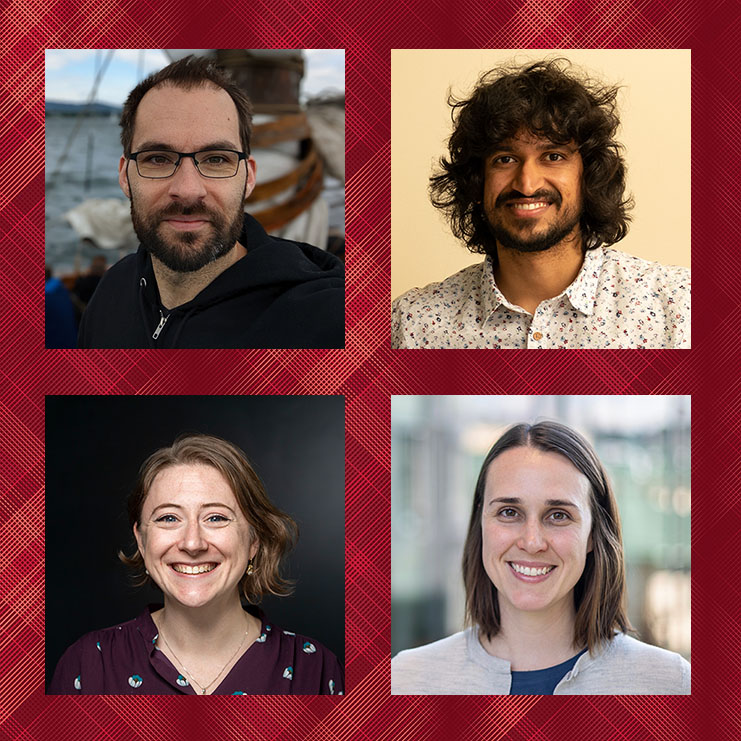Four SCS Faculty Named 2024 Sloan Research Fellows
Aaron AupperleeTuesday, February 20, 2024Print this page.

Four faculty members in Carnegie Mellon University’s School of Computer Science will receive Sloan Research Fellowships in 2024.
Nathan Beckmann, Aaditya Ramdas, Justine Sherry and Virginia Smith were among the 126 early career researchers announced as fellows. More than a thousand researchers are nominated each year, and winners receive a two-year, $75,000 fellowship that can be used to advance their research.
"Sloan Research Fellowships are extraordinarily competitive awards involving the nominations of the most inventive and impactful early career scientists across the U.S. and Canada,” said Adam F. Falk, president of the Alfred P. Sloan Foundation. “We look forward to seeing how fellows take leading roles shaping the research agenda within their respective fields.”
The fellowships honor exceptional researchers whose creativity, innovation and research accomplishments make them stand out as the next generation of leaders. A Sloan Research Fellowship is one of the most prestigious awards available to young researchers, in part because so many past fellows have gone on to become distinguished figures in science.
Beckmann is an associate professor in the SCS Computer Science Department (CSD) with a courtesy appointment in the Electrical and Computer Engineering Department (ECE) in the College of Engineering. His research focuses on improving energy efficiency of computer systems, spanning computer architecture, compilers, computer systems and performance modeling. He leads the Computer Organization Research Group (CORGi), which is designing new spatial dataflow computer systems that move computation closer to data to reduce energy by orders of magnitude. His research on data center caches is widely deployed at Meta, and his processor designs are being commercialized at the CMU spin-out Efficient Computer Company.
Ramdas is an assistant professor in the Machine Learning Department and the Dietrich College of Humanities and Social Sciences’ Statistics and Data Science Department. His research focuses on foundational topics in statistical inference and learning, ranging from how modern artificial intelligence systems can quantify uncertainty of their predictions to a new theory of measuring and combining statistical evidence based on game theory principles. These areas of exploration have had direct implications for reproducible research in the sciences, especially psychology, neuroscience and genetics. Ramdas develops practical theory, with his algorithms deployed in public-facing software at many tech companies. His work has also had an impact on the social sciences with the development of a new rigorous auditing methodology that has been applied to elections, real estate taxation and financial transactions.
Sherry, an associate professor in CSD with a courtesy appointment in ECE, is interested in everything networked — from protocols and applications to networking hardware. Much of her research focuses on middleboxes and network functions, specialized devices that inspect and modify network traffic to secure internet connections and make data load more efficiently. Sherry's work has impacted the design and implementation of these devices in both research and in industry. Her work with researchers at CMU has included Pigasus, the world's first network intrusion detection system to operate over 100 Gbps with the resources of a single server.
Smith is an assistant professor in MLD with a courtesy appointment in ECE whose research spans machine learning, optimization and distributed systems. Smith’s work aims to make federated learning — a technique that considers learning across private, distributed data silos — as seamless and secure as learning over centralized data. Recent work has addressed challenges related to privacy, efficiency and robustness to enable trustworthy federated learning at scale. Her research has powered applications including language modeling in mobile phones, smart home anomaly detection and pandemic forecasting across hospitals.
Learn more about the Alfred P. Sloan Foundation and its fellows at the association’s website.
Aaron Aupperlee | 412-268-9068 | aaupperlee@cmu.edu
